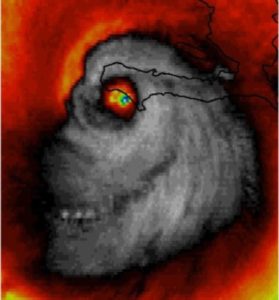
Hurricane Matthew is looking pretty creepy in this NASA Earth Sciences image.
Don’t let Matthew ruin your appeal!
Three Florida Appellate Courts have announced closures so far due to Hurricane Matthew. The Third and Fourth Fourth District Courts of Appeal will be closed from 1 pm today through Friday October 7th, while the Fifth District will be closed Thursday and Friday. The Florida Supreme Court aggregates announcements about emergency closures for the entire state court system on its emergency page.
What is the effect of a court closure on deadlines and argument? Certainly, argument is cancelled and will have to be rescheduled. But what about regular deadlines? It appears an emergency closure does not count as a “Court Holiday” under Florida Rules of Judicial Administration Rule 2.514(4)(B) — the Courts are not calling it a “holiday,” and doing so probably has personnel implications that Court administration doesn’t want to deal with. However, the Florida Supreme Court generally issues administrative orders extending deadlines in the affected counties, and likely will do so in the wake of Hurricane Matthew. The orders generally state that the Supreme Court is intending to “equitably relieve parties in all pending cases by extending legal time limits that they otherwise would have been unable to meet due to the emergency.” See, e.g., AOSC16-23, In re EMERGENCY REQUEST TO EXTEND TIME PERIODS UNDER ALL FLORIDA RULES OF PROCEDURE FOR HILLSBOROUGH COUNTY IN THE THIRTEENTH JUDICIAL CIRCUIT [.pdf]. And if the emergency further impedes the attorney or client, then the trial court is directed to resolve the claim “case-by-case basis when a party demonstrates that the lack of compliance with requisite time periods was directly attributable to this
emergency and that equitable remedy is required.” Id. I wouldn’t worry about a deadline for filing a brief — the extension will either be automatically granted by an administrative order, or the Court will be receptive to a motion for leave to accept a late-filed brief.
But what about deadlines that are not normally allowed to be extended? Rule 1.090 states that, even for good cause, a Court:
may not extend the time for making a motion for new trial, for rehearing, or
to alter or amend a judgment; making a motion for relief from a judgment under
rule 1.540(b); taking an appeal or filing a petition for certiorari; or making a
motion for a directed verdict.
There is some authority on this issue, but it is sparse and not directly on point. The Third District has held that the statute of limitations is not tolled by an administrative order closing the courts for weather-related issues. Ramirez v. McCravy, 4 So.3d 692 (Fla. 3d DCA 2009) [.pdf]. The Fourth District has held that hurricane-related closures and the resulting administrative order did toll a deadline, but it was a deadline to file for review of arbitration, which is not one of the types of deadlines excluded from enlargement by Rule 1.090. Rasabi v. Salomon, 51 So.3d 1284 (Fla. 4th DCA 2011) [.pdf]. And certainly, a court may by administrative order declare a date a Holiday, thus eliminating that day from being counted as the last day in any time calculation under Rule 2.514. See, e.g., R.J. Reynolds Tobacco Co. v. Kenyon, 826 So.2d 370 (Fla. 2d DCA 2002)[.pdf] (applying prior time calculation rule). Maybe since the Florida Supreme Court promulgated Rule 1.090, its administrative orders can supersede this issue. But I wouldn’t count on it, and I certainly wouldn’t want to be the guinea pig having to argue it to the Court in order to preserve my client’s right to appeal.
Here’s what I recommend: When it comes to a notice of appeal or a motion for rehearing, best not to mess around. Get it filed by the deadline, or early, rather than rely on a yet-to-be issued AO. Jurisdictional and hard deadlines are not to be messed with. And if your issue is the timeliness of a Rule 1.530 motion for rehearing or new trial, don’t wait for the timeliness issue to play out: file your notice of appeal no later than the 30th day after the original order was filed with the clerk, rather than counting on tolling. Since the 2015 rules change eliminated the trap caused by the old rules, and filing a notice of appeal no longer abandons a properly filed motion for rehearing, there’s no reason not to just get the notice of appeal on file, even if the fight over the timing of the 1.530 motion is still pending. See Fla. R. App. P. 9.020(i)(3)(stating that appeal shall be held in abeyance while tolling motion is decided).
What happens if you do get in a pinch? If you have to make the Hail Mary throw, perhaps a Rule 1.540(b) motion asking for the judgement to be re-issued due to excusable neglect could work. The appellate courts have very rarely ordered trial courts to grant such motions where the court found excusable neglect in determining the date final judgment was rendered, in order to allow for a timely appeal. See, e.g., Pompi v. City of Jacksonville, 872 So.2d 931 (Fla. 1st DCA 2004)[.pdf] (reversing denial of Rule 1.540(b) motion and ordering re-issuance of judgment). Those cases were all in the context of the date of rendition being unclear due to multiple filing stamps on the final judgment, not in the context of missed deadline due to weather. Loss of power might be considered excusable neglect, for example. But best not to go there. Get it filed! Even a one page, incomplete, or in-the-wrong-court Notice of Appeal will preserve the rights, even if you later have to amend it. See, e.g., Kaweblum v. Thornhill Estates Homeowners Association, Inc., 755 So.2d 85 (Fla. 2000) (notice of appeal filed in wrong court preserved right to appeal).
To my fellow Florida attorneys, and anyone else in Hurricane Matthew’s path, be safe.

